C.H.I.L.D. Supports the Proposed 2025-26 Special Education Budget
- Details
- Written by: Joanne Wallenstein
- Hits: 2206
 (This statement was read at the Scarsdale Board of Education meeting on April 7, 2025.)
(This statement was read at the Scarsdale Board of Education meeting on April 7, 2025.)
Good evening. My name is Erin Rudensky, I am co-chair of C.H.I.L.D. along with Rachana Singh and Jessica Freede.
For those of you that are unfamiliar with C.H.I.L.D., we are a subset of the Parent Teacher Council. We function as both a support group and advocacy group for parents in our district whose children have an IEP or a 504 plan. Currently, roughly 1 in 4 children in Scarsdale fall into this category, with 14% of all students having an IEP. For those unfamiliar with this term, an IEP is an Individualized Education Plan which requires accommodations and services based on the child's disability that is mandated by the state.
In Scarsdale, many of the state requirements not only benefit the student with the IEP but also benefit the general ed students in the class with them. For example, the state mandates a student to teacher ratio. So, in an elementary ICT or integrative co-taught class, general ed students without an IEP or 504 benefit from the small groups within the class afforded to them by an additional teacher or aides in the classroom. If these types of programs were not implemented, these students would have less time with their teacher due to the overwhelming demand many students with learning differences or social emotional needs present to a single teacher. If a full class of 24 students includes 6 students with an IEP or 504 plan, think about how much time the teacher would be taking away from the rest of the class to address those student’s needs. In Middle School and High School, special ed teachers that push into the classroom eliminate the need for the teacher that specializes in the specific content area to interrupt the class to tend to special ed students. These models allow students with learning differences to be in the Least Restrictive Environment. This means that students with disabilities can and should be educated in the general education setting with their non-disabled peers. Unless their IEP determines a more restrictive environment, like a special ed classroom or special ed school, which is necessary for them to receive a Free Appropriate Public Education.
One of the long-term goals of the district has been to offer a continuum of services to all students that live in our district that have a disability or learning difference. We have always agreed with the district's philosophy that the best way to continue implementing this goal is for Scarsdale residents to be able to send their children with a 504 or an IEP to a Scarsdale school. Our most vulnerable students deserve to feel included and be a part of our community while accessing their general education and being provided a Scarsdale education. This continuity ensures that all types of learners know they have a place in our school district and are valuable members of our community. They must not be disenfranchised.
While we understand and share everyone's concerns for the growing costs across all areas of the budget, we feel very strongly that the increase budgeted for next year's special ed programming is both mindful and necessary. While roughly $500,000 is for the rising costs of salaries and benefits such as health insurance for the existing special education team, the other $500,000 is for current Scarsdale students to be able to continue their education in the district. This includes children in the 8:1:2 program being able to continue on to Scarsdale Middle School, and students in the Bridge program being able to continue on to Scarsdale High School in the 12:1:1 program. Besides that this is the right thing for our students, it is also fiscally responsible as the cost to send these students out of district would cost roughly $736,000 that we would need to pay. That is actually a savings of close to a quarter of a million dollars.
Therefore, we would like to reiterate that CHILD supports this year's proposed special education budget. And it should go without saying that the families of special ed students are equal stakeholders, taxpayers, and members of this community.
In addition, we are advocating for the district to conduct a survey of both special ed parents and teachers regarding the efficacy of our special ed programs as we embark on the next five-year plan.
Thank you.
Parents Express Frustration with Reveal Math Curriculum
- Details
- Written by: Wendy MacMillan
- Hits: 6529
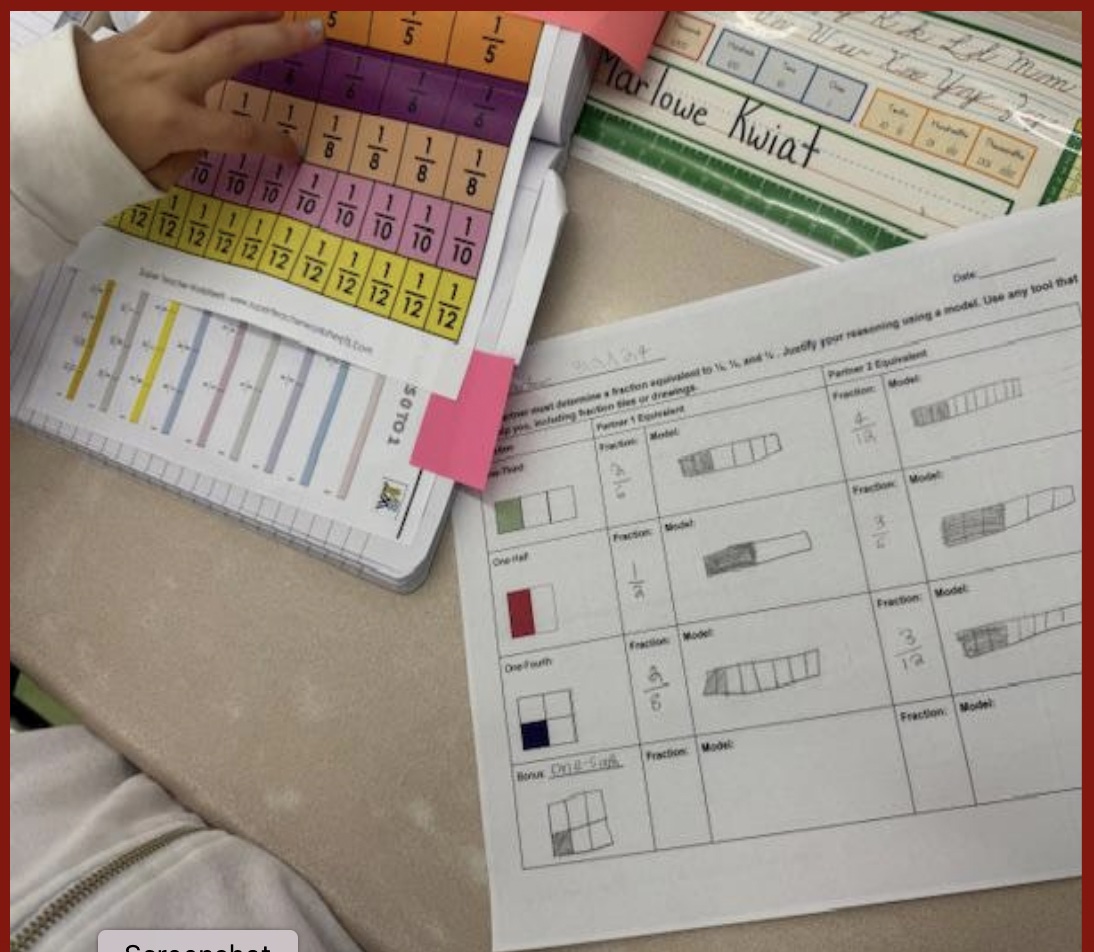 At recent Board of Education meetings and at the Board’s less formal “Community Coffee” meetings, many parents have voiced their concerns about the somewhat newly adopted Reveal Math curriculum utilized in Scarsdale’s elementary schools. Some of the criticism describes lessons that are too word heavy especially for younger students, students who struggle to read, and for ESL learners. These parents also assert that because their children experience such difficulty with Reveal Math lessons, they have had to seek outside support to enhance their children’s math development.
At recent Board of Education meetings and at the Board’s less formal “Community Coffee” meetings, many parents have voiced their concerns about the somewhat newly adopted Reveal Math curriculum utilized in Scarsdale’s elementary schools. Some of the criticism describes lessons that are too word heavy especially for younger students, students who struggle to read, and for ESL learners. These parents also assert that because their children experience such difficulty with Reveal Math lessons, they have had to seek outside support to enhance their children’s math development.
Dr. Edgar McIntosh, Assistant Superintendent of Curriculum, has maintained an open door policy welcoming the opportunity to answer parent’s questions and to explain the District’s approach to elementary math curriculum. In an effort to “build trust through transparency,” at the BOE meeting on Monday, March 24th, McIntosh also delivered a detailed presentation “designed to address questions, review research and rationales and offer relevant data and specific examples demonstrating our progress over the past three years.”
McIntosh, joined by the District’s two elementary math coordinators, gave a thorough overview of the extensive process that went into choosing Reveal Math, the research that supports Reveal Math’s approach, and how the student-centered curriculum is implemented in grades K-5.. Viewers were treated to photos and videos demonstrating how students engage in math activities at each grade level including videos of them exploring math problems, taking part in non-Reveal (but aligned) enrichment activities, practicing number routines to build fluency and flexibility, explaining their thinking (though collaborative games), and demonstrating conceptual understanding of complex procedures.
The presentation included graphics demonstrating Scarsdale student’s math proficiency and how they continue to outperform peer districts.
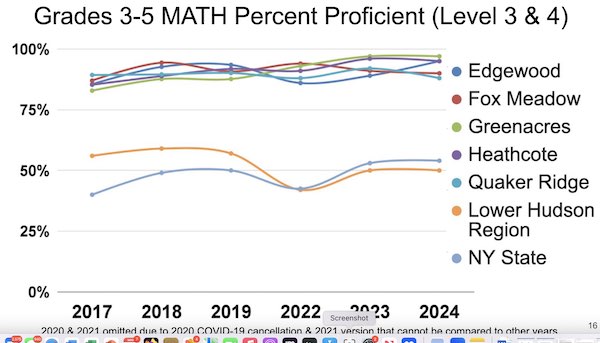
Additionally, the presentation worked to dispel some of what McIntosh describes as common misperceptions about Reveal Math.
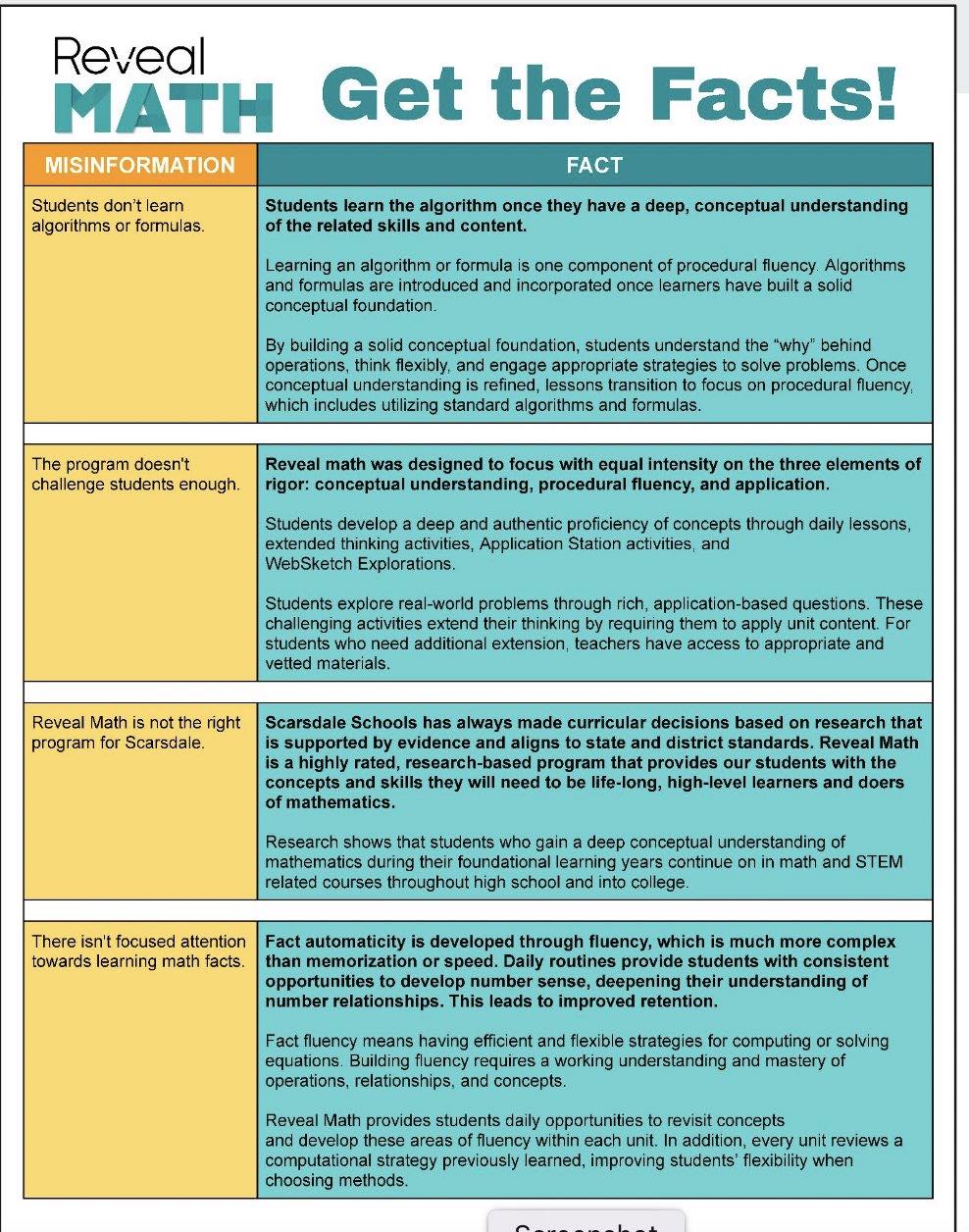
Before ending the presentation, McIntosh made a point to explain the value of the two math coordinators, saying, “Their support extends beyond the classroom to provide guidance for administrators, assisting in decision making processes and ensuring our math program aligns with broader educational goals…Through educator feedback, they continuously assess and adapt our curriculum to meet evolving educational needs, ensuring that it remains relevant and effective.”
McIntosh also stated, “We are in the process of launching a Math Resource website for families and also planning additional parent workshops which will be announced. This will give a chance for us to follow up on this presentation in a smaller setting with materials and hands on opportunities. We also urge our parents to engage our teachers in questions about their child's math journey as the first line of questioning.”
After the presentation, BOE members were afforded time to comment and to ask questions and a robust discussion ensued. Leah Dembitzer shared her appreciation of the thorough presentation but drew attention to parental concern about reading comprehension and reading fluency as an issue with Reveal Math.
Dr. McIntosh responded with recognition that some parts of the curriculum can be language heavy and shared that they have been making some adaptations such as formatting pages to have fewer words. Mcintosh went on to explain that teachers graduate their lessons to meet their students where they are at. As he stated, “When students start school in September, teachers will start by reading the math problems aloud and introducing students to the vocabulary.” He also pointed out that all the other curriculums that the District evaluated and explored, were also much more language heavy as there is a move towards emphasizing conceptual understanding and problem-solving so that students are able to articulate mathematical concepts.
BOE member Colleen Brown added that Scarsdale is fortunate to have such skilled and expert teachers who know how to differentiate the learning and support students using a variety of methods. She also expressed her hope that teachers stay in contact with parents to say, “This is how in partnership, we continue to support your child.” She went on to share, “I think as math instruction changes and evolves and maybe moves away from the way we were taught…that having opportunities for parents to understand what's coming home is something that I think our community has voiced that they need. I think it's important to make sure we spend the time to try to coordinate moving forward. Lastly, now that I have kids in high school, I see they are required to do those types of {math} statements, so I see the value in starting that type of thinking earlier, and I appreciate that.”
BOE member Ron Schulhof also expressed his appreciation for Dr. McIntosh and the math coordinators for the detailed presentation, but he also wondered if the experience outlined in the presentation matched the experience of what parents are seeing at home.
Though the presentation was detailed and comprehensive, several parents who stayed late into the evening to speak during the Public Comment period, expressed their continued concern with the curriculum.
One parent began his public comment by addressing the late hour of the presentation noting that many elementary school parents had to leave the meeting to attend to their children. The father proposed that the District gives the parents a better opportunity to speak up about this issue. He went on to express parents’ desire for improved communication. In addition to a call for a parent surveys, he suggested, “I would like to propose that the district creates a set of publicized adjustments, goals and milestones. It would be great if you could meet in two months in May, before the school year is over, to discuss the progress and address our concerns and as a broad community.”
Another parent, who is also a middle school math teacher from a neighboring district, conveyed his appreciation that Scarsdale has made great strides with the Reveal Curriculum and that students' understanding has improved. He went on to share his concern that, “It appears that the implementation of the Reveal Curriculum may not be universal across all classrooms within the same grade. If it is the Reveal Math program that you have chosen, I would think that there would be more universal implementation across the grade level. It sounds like parents are seeing different things coming home and their kids have different experiences in the schools.”
The father said, “Students would benefit from several additional resources. First, Reveal Math has these replay videos…My daughter and I used to use them at home last year. This year we don't have access to them. They were really beneficial. If these replays are available to some students in the district, shouldn't they be available to all students in the district? Another thing we'd like to see is increased usage of physical and virtual manipulatives.”
After advocating for assessments to be more consistently shared with parents (in order for parents to own a solid understanding of how their child is doing with a given subject matter), he ended his public comment by saying, “There should be some additional fact, fluency component. While Reveal is really strong with conceptual understandings, there's not an emphasis on Fact Fluency. Scarsdale used to use Reflex. That's a nice add on Fact Fluency component…As a middle school math teacher, I see firsthand how students who lack Fact Fluency can struggle even if they currently understand the sixth grade concepts. You need factors and multiples for almost every topic in sixth grade, fractions, decimals, percents, ratios, proportions, and if your Fact Fluency and automaticity is not there, students are going to be behind.”
Another mom of an elementary aged student said she does not oppose Reveal Math and trusts our professional educators to pick the curriculum that would be the best fit for our district. She then shared, “However, considering the extensive community feedback we got, I believe a comprehensive evaluation of Reveal Math should be conducted within the next year, instead of waiting for six years into the implementation…A delayed review will create significant academic consequences, especially for those students who are already facing challenges in math.”
She continued, “The evaluation should be data driven. Should incorporate benchmark performance indicators such as state test statistics. I'm glad to see some of those statistics in the presentation, but I think we should actually go back even further. For example, the Star Rating only shows three years. We should see a comparison when Singapore Math was in place and when Reveal Math got switched.” She advocated that this review should include more teacher feedback as well to ensure that Reveal Math is widely and well-received across all the classroom teachers.
She ended her comment by sharing, “Furthermore, I recommend conducting a parent survey to understand how many students are receiving supplemental math support outside of school. The prevalence of additional tutoring or extracurricular math programs should be considered when we're comparing performance during the period Singapore Math was in place and the periods where we switched to Reveal Math.”
One mom, who happens to also be a PTA president, discussed her third grader’s difficulties with Reveal Math saying, “My child has not struggled with reading comprehension at all, yet she finds the word problems very challenging and often asks for help. To be honest, I sometimes find them difficult to understand.” When this mom asked her child’s teacher about her child’s progress in math, she was told that while her daughter “is understanding all the concepts, she is hesitant, and she asks for help often. She needs more confidence.”
A large concern for this mom is that this lack of confidence will lead to a lack of engagement. In addition, a lack of basic math fluency and too much “productive struggle” will lead to further disengagement. She concluded her statement by saying, “Even though I'm speaking on behalf of myself and not as PTA president, I have spoken to countless parents about their dissatisfaction with Reveal Math. I recognize I cannot speak on behalf of the community, but I can relay that a significant number of families who have spoken to me about Reveal Math have supplemented with Russian Math or Kumon.”
Another mom also shared that her children struggle with Reveal Math and described how, “It took my fifth grader until fifth grade to learn that she can be good at math because there is so much mumbo jumbo and poorly worded word problems.” She added that her, “First grader was crying and had to be comforted outside of the classroom because she was unable to understand a very confusing word problem she had to read in math.” Among other concerns the mom shared, “We all know that early confidence is key to kids enjoying and being engaged in whatever subject that is, and especially math.” She then implored the BOE to return to the Singapore Math curriculum.
Yet another parent urged the district to conduct a survey looking at what percentage of children in the Scarsdale district use outside math support for their children and to gauge parents' satisfaction with the Reveal Math program. She stated, “We need challenging, proven programs that build strong foundations, not a curriculum aimed at meeting minimum state standards. “In a tech world, driven by new innovations, scholars must prioritize excellence in math education, allowing our children to reach their highest potential.”
A concerned father said, “My fourth grade son is a bright student. Reveal Math doesn't work for him. He finishes his homework in no time and is extremely bored and unchallenged in the classroom. But this curriculum doesn't seek to differentiate. Last year, when finishing work early, my son was asked to answer questions in his Reveal Math notebook such as: What helps you feel relaxed when you're frustrated? How do deep breaths help you feel relaxed? What are some ways to connect with your classmates?” After going on to describe how his eldest child, who was taught Singapore Math, is now a thriving math student at SHS, the father questioned, “Why did you change something that was working for Scarsdale, and it's still working for other performing districts in this area?”
One of the last people to comment in person, shared that she too is an experienced educator and expressed her appreciation for the presentation and for the amount of work given to selecting Reveal Math for the District. However, she went on to say, “I'm having a great deal of difficulty understanding how the District believed that Reveal Math was really the best and most appropriate curriculum for early learners. Do understand, I think your presentation was wonderful, but I have not personally experienced anything of what was shown in that presentation. While the Reveal Program seems to attempt to teach essential mathematical concepts in keeping with Common Core, its implementation and the way it's written is far from what I feel is developmentally appropriate for most early learners. One of the most glaring issues is that Reveal Math is language heavy and it relies on lengthy word problems, which are introduced to students far too early (at a time when they are still learning to read and master really basic literacy skills).”
She further explained, “The teachers have to work hard to supplement everything and Reveal Math is asking young students to navigate really dense, lengthy, complicated word problems that are far beyond what their current abilities are. And I heard ‘productive frustration' mentioned a few times, and I think there's a really fine line between productive frustration and overwhelming confusion, which is what my child was experiencing because of Reveal’s word heaviness.”
“Everyone should have a clear understanding after three years of all the available tools. But instead, it sounds like everyone's still trying to figure out how they can get Reveal Math to work. While I know through personal experience, there's no one size fits all program…it sounds like there are definitely better choices out there, and I'm curious to know which math program came in second and maybe even possibly third?” She went on to wonder about the lack of multi sensory aspects and manipulatives in Reveal Math, commenting, “Workbooks are not engaging. Kinesthetic learners are at a complete disadvantage.”
To conclude she shared, “I think the only way to find out how deep this problem runs is not using test scores, because no parent in the district is going to let their kid just just struggle. We're either going to help ourselves, we're going to tutor, or we're going to the Russian School of Math. And I think without polling parents as to what they're doing and how they feel about Reveal, using test scores, is just masking the problem.”
To watch the Math presentation or to hear the public comments in full, see here.
A One-Day Bootcamp for Regents, SAT and AP Test Prep
- Details
- Written by: Joanne Wallenstein
- Hits: 1482
 (Submitted by Michael Birnbaum of Regents Review)
(Submitted by Michael Birnbaum of Regents Review)
Regents Review is a test prep company that has been preparing students for New York State Regents Exams since 1976. What started out as a basement cram session with a teacher and some students over 40 years ago has now emerged into New York’s leading one-day bootcamp review for not only Regents Exams, but for Advanced Placement Exams and SAT/ACT Exams. We are family-owned and our story is unique. Our father, now a retired teacher, was known as the best math tutor around. During the spring Regents exam season, he would receive such a high demand from his students that he could not find the time to provide individual tutoring to each of them. So, instead, he developed a six-hour course where he reviewed the entire curriculum in one day. Initially, he held these classes in our basement. The kids loved it! He then hired the best teachers he knew to teach other subjects and the program grew from there. The program remained solely on Staten Island, where we grew up, until 2000. Then, we expanded the program and now offer classes in Westchester (Purchase College), Long Island (Adelphi University), and Rockland County (St. Thomas Aquinas College). In addition to our in-person offerings, we also offer an online option for many of our classes.
In our sessions, we review the entire curriculum in one day. We provide students study material on the morning of each class – this is great because they don’t have to go out and buy any additional books. We then use this material as we go over everything in a topic-by-topic format. A topic is reviewed and then the students are assigned a few exam-type questions that pertain to the topic. We then go over questions and explain why the correct answers are correct and why the incorrect answers are wrong. During the session the teachers will also give test-taking tricks and techniques. Every hour the students get a 5 - 10 minute break - this is very important as they need to rest, use the bathroom, or just stretch out and get ready for the next hour. The students also get a break for lunch, generally between 12:00 – 1:00. These classes are intense but they are very effective. Many students tell us how much more confident they are after they take our classes. At the end of the day the students will take home the material they worked on and they can continue to study with it before their exam.
Over the years, the exams have evolved. As the exams change, we coordinate our materials to align them with the updated curricula. It keeps us on our toes! Regardless, every year we have different teachers evaluate our material and we constantly update the material as needed. For example, this year, there are new Regents exams in Geometry, Biology, and Earth & Space Sciences. Our materials have been updated to reflect those changes, and our teachers are well-versed in the new exam format.
One typical challenge that many students face is that the test covers an entire year’s worth of material. Most kids don’t remember topics that they learned in September or October. This usually causes stress as they don’t know where to begin. Our instructors take that stress away and teach them everything that they need to know. The teachers will advise them on certain facts that they should put to memory because they are included on the exams every year. The instructors will also emphasize which topics require slightly less focus because they are seldom included on an exam.
We have been in business over 40 years and we have been growing every year. We are the original company to offer a one-day test-prep. We do our best to find the most enthusiastic instructors who are passionate about the topic they are teaching. In our experience, students generally enjoy our classes and want to attend for multiple subjects. It’s not uncommon for parents to call us and say that their children learned more in one day with us than they did in class all year.
Recently, a parent called explaining that her son, whose grades were good all year, was suffering from anxiety because of an upcoming exam. This particular student had trouble remembering subject topics he had learned in September and October and a few others along the way. After taking our one-day class, the mother contacted us to let us know that her son was feeling confident and that he received a 98 on the particular exam. Not only was his grade a success, but even more importantly, he lowered his test anxiety and restored his confidence, the greatest success of all.
Customers can register at RegentsReview.com – or by phone at 877-339-5970.
Summer 2025 Camp and Activities Guide
- Details
- Written by: Joanne Wallenstein
- Hits: 5505
 With the wind howling and snow on the ground, it’s hard to imagine that summer will ever be here - but it will – and now’s the time to start making plans for your children’s summer activities. Fortunately there are a wealth of terrific programs where kids can explore their passions, all within range of Scarsdale. Sports, theater, music, dance, nature, martial arts, language arts, academic enrichment and even sewing are all summer possibilities.
With the wind howling and snow on the ground, it’s hard to imagine that summer will ever be here - but it will – and now’s the time to start making plans for your children’s summer activities. Fortunately there are a wealth of terrific programs where kids can explore their passions, all within range of Scarsdale. Sports, theater, music, dance, nature, martial arts, language arts, academic enrichment and even sewing are all summer possibilities.
We reached out to many to participate in our Summer Guide and here are some programs for your consideration:
Day Camps
Beth El Day Camp
Beth El Day Camp, the premiere day camp in Westchester for ages 2-12, offers a top-notch experience with sports, tennis, swim, music, art, STEM, yoga, and more. With a commitment to safety, a nurturing environment, and low child-to-staff ratios, it’s the perfect place to spend the summer. Enjoy delicious lunches, towel service, and the expertise of best-trained professionals. Beth El ensures everything begins with love and ends in fun. Extended care available from 7:30am-6:00pm. Visit betheldaycamp.org for details and dates.
Beth El Day Camp, 1324 North Avenue, New Rochelle, NY 10804, (914) 235-2700 ext. 256, daycamp@bethelnr.org

French American School
The French-American School of New York (FASNY) offers a unique summer camp option for FASNY and non-FASNY students. Our Manor Camp is provided for children ages 3 to 11 at our expansive Manor Campus in Larchmont, NY. Camp is designed for new experiences, adventures, and life-long memories, we make languages and learning fun! Students participate in age-appropriate and theme-based activities using music, science, arts and crafts, cooking, and the outdoors to help with language acquisition. Camp is open to all students in grades N through rising 5th grade in both English and French of any level, no previous French is required. Join us today! French American School, email kgoldstein@fasnyorg, or call 914-250-0415.
Future Stars

Contact: purchase@fscamps.com or call (914) 273-8500 for more information or click here.
Sportime
Serious Tennis, Serious Fitness, Serious Fun! The John McEnroe Tennis Academy (JMTA) team is very excited for Summer Training Camp! The JMTA, where we train 52 weeks a year, is specifically designed for players ages 5-18 looking to continue their tennis training through the summer or simply spend their camp days focused on tennis. Participate in drills, instruction and matchplay in age and level appropriate groupings. Players train at JMTA Westchester’s home, SPORTIME Lake Isle, outdoors on our meticulously maintained har-tru courts and now on the brand new hard courts at Leewood Park.
Green and Yellow Ball (ages 9+) Camp Hours: 
Yellow Ball 14+ years old/ High School: 9am-1pm at Leewood Park
Yellow Ball U14: 10am-5pm
Green Ball 10am-5pm
Extended Day Available
Red and Orange Ball (ages 5-9) Camp Hours:
Half Day AM: 9am-12:30pm
Half Day PM: 12:30pm-4pm
Full Day: 9am-4pm
Extended Day Available
If you have any questions or need assistance with registration, please don’t hesitate to contact us by calling (914) 777-5151 or by emailing jmtawestchester@sportimeny.com. Visit us here. We are here to help!
Kids in the Game

Kids in the Game Camp: Join us as we look to make summer 2025 the best one yet. The Kids in the Game camp experience includes sports, arts and crafts, creative movement, field trips, swim, theme weeks, and more. Campers will be supported in expressing themselves and finding their passions, all while making lifelong friends and having a blast. Learn, laugh, and play all summer long!
Ages: 3.5 – 12 (Rising Pre-K4 – 7th Graders)
Camp dates: June 30th – August 15th
Camp hours: Pre-K4: 9 am – 2:30 pm. K-7: 9 am – 3:30 pm
Location: Annunciation School, 465 Westchester Ave, Tuckahoe, NY 10707
Costs: Starting at $655 per week. Use discount code: SD10583 for $50 off each week of Summer Camp,
Kids in the Game, Phone: 212-634-7262, Email: info@kidsinthegame.com,
Squire Advantage and Sports Camps
 Squire Advantage and Squire Sports Camps at Maria Regina High School in Hartsdale is celebrating over 50 years and is the proud recipient of the first ever Westchester County Inspector Choice Award! Squire Advantage Primary (grades K-3) and Advantage Choice (grades 4-9) is created for campers who wish to custom design their own schedule by choosing activities like swimming, sports, fine arts, science, cooking, martial arts, archery and more. There are more than 60 different activities to choose from! Squire Camps programs run from July 1st until August 16th, 2024. Courses are taught by certified schoolteachers, and hot lunch and early drop off is included. Extended day and transportation available. Attend our open house on February 1 from 1-4 PM.
Squire Advantage and Squire Sports Camps at Maria Regina High School in Hartsdale is celebrating over 50 years and is the proud recipient of the first ever Westchester County Inspector Choice Award! Squire Advantage Primary (grades K-3) and Advantage Choice (grades 4-9) is created for campers who wish to custom design their own schedule by choosing activities like swimming, sports, fine arts, science, cooking, martial arts, archery and more. There are more than 60 different activities to choose from! Squire Camps programs run from July 1st until August 16th, 2024. Courses are taught by certified schoolteachers, and hot lunch and early drop off is included. Extended day and transportation available. Attend our open house on February 1 from 1-4 PM.
Matt Davanzo, Director, Squire Camps, Maria Regina High School, Hartsdale, NY, (914) 328-3798.
Camp Ramaquois
Camp Ramaquois is not like every other camp. Our day camp for boys and girls ages 3 to 15 in Pomona, NY (only 30 minutes from the  George Washington Bridge and 15 minutes from the Mario Cuomo Bridge) provides a truly authentic camp experience. Our magnificent 44 acres, 5-acre lake, 9 heated swimming pools, and exceptional facilities and programs allow us to provide children with a dynamic and memorable summer filled with love, warmth, and being part of a special community. Our campers are encouraged to take healthy risks, learn new skills, develop relationships with their peers and counselors, develop independence and assume responsibility.
George Washington Bridge and 15 minutes from the Mario Cuomo Bridge) provides a truly authentic camp experience. Our magnificent 44 acres, 5-acre lake, 9 heated swimming pools, and exceptional facilities and programs allow us to provide children with a dynamic and memorable summer filled with love, warmth, and being part of a special community. Our campers are encouraged to take healthy risks, learn new skills, develop relationships with their peers and counselors, develop independence and assume responsibility.
Camp Ramaquois, 30 Mountain Road. Pomona, NY 10970, 845-354-1600.
Weinberg Nature Center
August Animal Visions: Participants enjoy animal time, hiking, ice sculpture, outdoor adventures, water fun, games, planting, yoga, lots of arts and crafts! For: 4-11 year old's Dates: August 4th - August 22nd [register for 1 - 3 weeks] Cost: $465 1 week $795 2 week $1435 3 week {Mamaroneck Strip is resident rate x 15% or Non-resident is resident rate x 20%}
 Little Ferns Nature Program: (forest preschool education): Students develop early scholarly and life foundations through nature education (80% outdoors) For: 2.5 - 5 year old's Dates: Spring Semester April 1st - June 13th 2025 Fall Semester Sept 15-dec 12 2025 Winter Semester Jan 12- March 27th 2026 Spring April 6- June 12 2025 Cost: Price measures (pay semesterly) Scarsdale $65 per class, Mamaroneck Strip $75 , non-resident $78. Observe Scarsdale School calendar holidays. Interview and Tour: Required
Little Ferns Nature Program: (forest preschool education): Students develop early scholarly and life foundations through nature education (80% outdoors) For: 2.5 - 5 year old's Dates: Spring Semester April 1st - June 13th 2025 Fall Semester Sept 15-dec 12 2025 Winter Semester Jan 12- March 27th 2026 Spring April 6- June 12 2025 Cost: Price measures (pay semesterly) Scarsdale $65 per class, Mamaroneck Strip $75 , non-resident $78. Observe Scarsdale School calendar holidays. Interview and Tour: Required
Afterschool Forest Adventures: Hiking, Nature Arts, Animal Time, Ecology and Planting. FOR: 2 - 10 year old's. Dates: Every semester $250 resident $288 Mamaroneck Strip $300 non-resident.
Birthday Events: Enjoy live animal presentations, fire-making/roasting marshmallows, hiking, scavenger hunt, other possible activities/themes. For 2+ year old's. Cost: $450 up to 14 children 15-25 children $550 26-35 children $600
Register online with the Scarsdale Department of Parks, Recreation and Conservation, 914-722-1160 or online here:
Pre- College
Adelphi Summer Pre-College Program
Adelphi’s Summer Pre-College Program will take place from July 13-August 2, 2025 and is open to rising sophomores, juniors and seniors in high school. Our credit-bearing program allows students to explore an academic area of interest, participate in college readiness workshops, and discover all that Adelphi University has to offer. Both residential and commuter options are available.
This summer's courses include:
Art Foundations: Drawing and 2D Design
Business and Entrepreneurship
Communications and Critical Thinking
Computer Science and Coding
Creative Writing Workshop
Digital Media Production: Filmmaking and TV
Introduction to Nursing as a Career and Profession
Music Production and Sound Mixing
Pre-Law: Understanding the Bill of Rights
Pre-Med: Microbiology, Nutrition, and Human Disease
Psychology and Pop Culture
Quantum Engineering
Speech-Language Pathology and Audiology
Take an amazing class, make new friends, and earn college credits all in our summer program tailored just for you! Visit us here to learn more and to apply today!
The Arts
 Central Park Dance
Central Park Dance
Central Park Dance's extraordinary 2025 summer programs are held at our new state of the art facility equipped with five inviting studios! We offer full class schedules for children and adults as well as performing arts dance camps and accelerated workshop programs. We pride ourselves on our team of experienced and reputable teachers skilled in teaching a wide variety of dance styles and training all ages.
Central Park Dance, 165-171 South Central Avenue, Hartsdale, 914.723.2949. Learn more and register at centralparkdance.com.
Hoff Barthelson
The Summer Arts Program at Hoff-Barthelson Music School offers two dynamic 2-week sessions designed for students entering grades 1-9. Co-directed by Donna Elaine and Rie Matsumoto, this program runs from July 7 to August 1, 2025, with students able to attend one or both sessions. The program provides a wide range of creative opportunities in music, movement, and visual arts, allowing children to explore new instruments, hone performance skills, immerse themselves in different artistic forms, and make lasting friendships. Students benefit from personalized attention by an exceptional faculty of top teaching artists in a nurturing, supportive environment.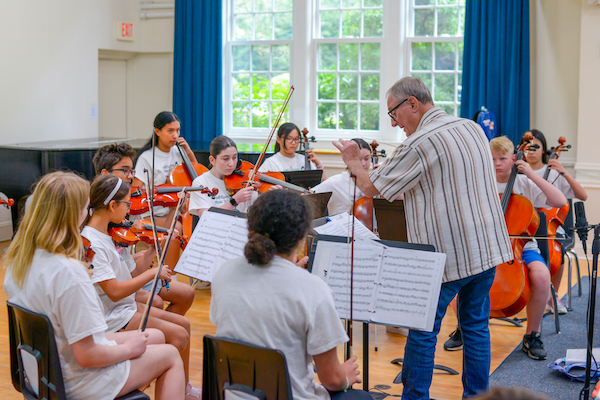
Morning, afternoon, and full-day options are available, with early drop-off and late pick-up for convenience. Each session culminates in lively performances, allowing students to showcase their learning. Courses offered include group lessons in various instruments, chorus, orchestra, jazz band, world drumming, music history, music technology, and visual arts. Early-bird registration discounts are available until April 4, 2025.
In addition to the Summer Arts Program, Hoff-Barthelson offers specialized offerings in vocal performance and musicianship during the summer months:
• The Summer Vocal Institute, running from August 11-15, 2025, is an immersive program for students entering grades 8-12. It provides comprehensive vocal training, focusing on a range of styles, including Italian art songs and Broadway hits. Students will have the chance to perform in a special concert at the end of the week.
• Summer Musicianship Lab is designed to enhance music theory and aural skills for students in grades 3-12. Meeting weekly on Wednesdays from June 11 to August 13, this program combines independent learning and group discussions to build a deeper understanding of music. Additionally, the Summer Advanced Placement Prep helps students prepare for the AP Music Theory exam, offering focused training on key concepts and aural skills.
These summer programs at Hoff-Barthelson provide a rich, engaging experience for young musicians, fostering growth, creativity, and performance skills in a vibrant community.
Hoff-Barthelson School of Music, 25 School Lane, Scarsdale, 914-723-1169, summerarts@hbms.org. Learn more and register here.
Honest Art
Discover the joy of creativity at Honest Art's Summer Camp! Our engaging program offers kids a fun-filled experience where they explore painting, sculpting, candle making, and so much more in a vibrant, inspiring environment. With hands-on projects and outdoor activities, campers will unleash their imagination while making new friends and lasting memories. Morning, afternoon, and full day options available - book today at honestart.com. Honest Art, 708 Saw Mill River Road, Ardsley, NY 10502, 914-309-9334.
Play Group Theater
The Play Group Theatre in White Plains is preparing kids for every stage of life while giving them the tools they need to succeed on stage today. Play GroupTheatre offers a fun-filled, non-competitive performing arts program that provides actor training at the highest level while fostering friendships and building skills that last a lifetime. To sign up for spring programs and summer camps, please visit playgroup.org. Play Group Theatre, One North Broadway, White Plains, 914-946-4433, info@playgroup.org.
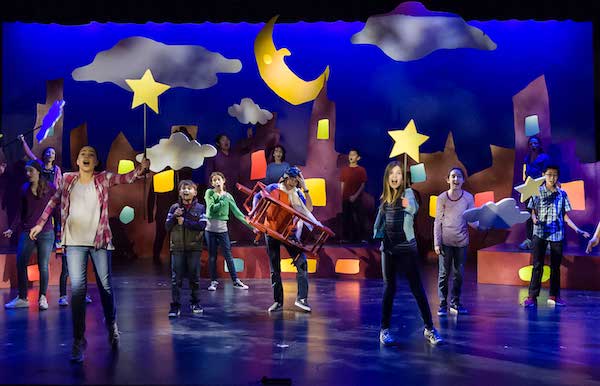
Random Farms Kid’s Theater
Random Farms Kids’ Theater brings the drama to the summer camp experience with their Summer Workshop Intensive program for children in grades 3 - 9 (as of fall 2025). Our inclusive program requires no prior theater experience, and features four different, two-week long sessions, that include crafts and theater games along with rehearsals for a musical theater production at the Paramount Hudson Valley Theater!
 This summer’s offerings include:
This summer’s offerings include:
Newsies, JR. - Session 1 July 7 - 18 and Session 2 July 21 - August 1
The SpongeBob Musical: Youth Edition - Session 3, August 4 - 15
The Lion King, JR. - Session 4, August 18 - 29
New families can use the code NEWSUMMER for $100 off tuition.
Visit RandomFarmsNY.org/SWI for more information and registration.
Rye Arts Center
 The Rye Arts Center invites all ages to register for a variety of enriching arts programs this summer! Teaching artists and expert instructors will guide participants through a multitude of courses and disciplines such as painting, ceramics, sculpture, musical theater, music lessons, and STEAM programming. With flexible week-to-week availability and morning and afternoon options, there’s a perfect fit for every schedule! Join The Rye Arts Center for a summer where creativity takes center stage, and all are welcome to learn and create in a supporting, welcoming environment. Financial aid is available, please inquire. Scan the QR code to stay abreast of imminent registration for our extremely popular summer arts programs!
The Rye Arts Center invites all ages to register for a variety of enriching arts programs this summer! Teaching artists and expert instructors will guide participants through a multitude of courses and disciplines such as painting, ceramics, sculpture, musical theater, music lessons, and STEAM programming. With flexible week-to-week availability and morning and afternoon options, there’s a perfect fit for every schedule! Join The Rye Arts Center for a summer where creativity takes center stage, and all are welcome to learn and create in a supporting, welcoming environment. Financial aid is available, please inquire. Scan the QR code to stay abreast of imminent registration for our extremely popular summer arts programs!
The Rye Arts Center, 51 Milton Road. Rye, NY 10580, (914) - 967- 0700, info@ryeartscenter.org
Sew Happy
Get ready for a fun packed summer! Sew Happy is pleased to offer half day and full day summer camps for ages 5-14 this summer. Join us for Me & My Doll, Hand Sewing, Machine Sewing, or Fashion Design. Kids love mastering the basics like threading a needle; tying a knot; or sewing on a button, and we have tons of fun projects that they’ll take home at the end of the session. If you’re looking for a little break from the sun and the screens, this may be your happy place.
NEW! Are you *Sew Ready* for Kindergarten? Come spend a week playing with us. Kids have so much fun that they hardly notice they’re practicing fine motor skills; sequencing; following directions; and problem solving. Look out elementary school. We are Sew Ready!!
Sew Happy Studios - 154 East Boston Post Road, Mamaroneck, NY - 917-885-7716 - info@sewhappyusa.net.
Steffi Nossen School of Dance
A Summer Experience you do not want your dancer to miss - one- and two-week camps and intensives for various ages, levels and interests. Pre-school weeklong morning Story-Book Camps throughout the summer explore the pages of a new book each week, creating dances and building crafts based on the story and 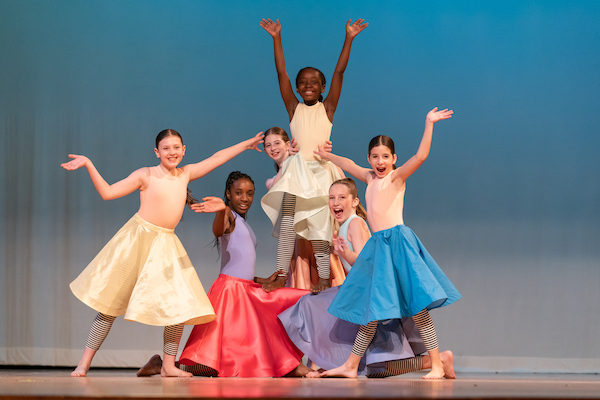 performed at week’s end. In Dance Camp (grades 1-5) and Dance Intensive (grades 6 and up) beginner and intermediate campers explore diff dance styles - Ballet, Modern, Jazz, Hip-Hop, Musical Theater dance history and create their own choreography leading to in-studio performance on Friday. Musical Theater Camp Grades 1-5) and Intensive (grade 6 and up) are targeted to the musical theater dancer/ actor/singer working with professional voice, acting and dance teachers on techniques to enhance vocal and acting training while honing dance technique and performance ability. Campers take daily acting, voice, and dance classes, participating in theater games, exercise, and technique classes in a nurturing environment; recommended for actors needing dance training and dancers who want to explore singing and acting. Each week campers learn music and choreography from a different musical, culminating in a Showing at week’s end. Our exciting new Dancing Through the Movies Camp (grades 1 –5 ) blends the joy of singing and dancing with the magic of NEW movies: Moana 2, Inside Out 2, Spellbound, The Smurf Movie, and If. The movie of the day serves as inspiration for singing, acting, Jazz and Musical Theater classes - experimenting with movement and crafting dances, helping to build strong communication skills and self-confidence. The week wraps up with an in-studio showcasing. No experience needed —just bring your enthusiasm and love of dance. The summer is rounded out by an Adaptive Adult Musical Theater Workshop June 24 – 27 with teachers leading dancing to music from popular shows on Broadway and musical movies, creating own dances, and participate in a performance at week’s end. For information: 914-328-1900, info@steffinossen.org, 216 Central Ave. White Plains; or click here.
performed at week’s end. In Dance Camp (grades 1-5) and Dance Intensive (grades 6 and up) beginner and intermediate campers explore diff dance styles - Ballet, Modern, Jazz, Hip-Hop, Musical Theater dance history and create their own choreography leading to in-studio performance on Friday. Musical Theater Camp Grades 1-5) and Intensive (grade 6 and up) are targeted to the musical theater dancer/ actor/singer working with professional voice, acting and dance teachers on techniques to enhance vocal and acting training while honing dance technique and performance ability. Campers take daily acting, voice, and dance classes, participating in theater games, exercise, and technique classes in a nurturing environment; recommended for actors needing dance training and dancers who want to explore singing and acting. Each week campers learn music and choreography from a different musical, culminating in a Showing at week’s end. Our exciting new Dancing Through the Movies Camp (grades 1 –5 ) blends the joy of singing and dancing with the magic of NEW movies: Moana 2, Inside Out 2, Spellbound, The Smurf Movie, and If. The movie of the day serves as inspiration for singing, acting, Jazz and Musical Theater classes - experimenting with movement and crafting dances, helping to build strong communication skills and self-confidence. The week wraps up with an in-studio showcasing. No experience needed —just bring your enthusiasm and love of dance. The summer is rounded out by an Adaptive Adult Musical Theater Workshop June 24 – 27 with teachers leading dancing to music from popular shows on Broadway and musical movies, creating own dances, and participate in a performance at week’s end. For information: 914-328-1900, info@steffinossen.org, 216 Central Ave. White Plains; or click here.
The Younger Set
Summer Stars at Scarsdale Synagogue
Summer Stars at Scarsdale Synagogue is a seven-week camp experience offered to children ages 18 months to 6 year-olds. Our campers are engaged in activities such as sports, music, art, daily water play and much, much more. We also have a special day each week focusing on a theme such as Circus Day, Hawaiian Day or Carnival Day. We strive to foster friendships in a warm, nurturing environment and encourage children to grow socially, emotionally and intellectually as they engage in fun, stimulating summer activities. We offer a three-day option for Toddlers ages 18 to 30 months and our two year-olds may choose 3 or 5 mornings a week. Our three year-olds to six year olds may choose a half-day 9:00-12:00 option or a full-day 9:00-2:00 option which includes a served lunch. Contact Jody Glassman at mazeltots@sstte.org or 914-723-3001, or click here.
Board of Ed Congratulates Regeneron Semi-Finalist, Names District Architects and Offers Update on Puberty Education
- Details
- Written by: Wendy MacMillan
- Hits: 2597
 The first Board of Education Meeting of 2025, was short and sweet but still managed to cover a lot of important topics. Some of the matters discussed included a congratulations to an SHS Regeneron Science semifinalist, an overview of the District’s budget planning process, appointments of an architect and engineering firm, and construction management firm, and the Board’s decision on the NYSED Regionalization Initiative, just to name a few.
The first Board of Education Meeting of 2025, was short and sweet but still managed to cover a lot of important topics. Some of the matters discussed included a congratulations to an SHS Regeneron Science semifinalist, an overview of the District’s budget planning process, appointments of an architect and engineering firm, and construction management firm, and the Board’s decision on the NYSED Regionalization Initiative, just to name a few.
Regeneron Science Talent Search Semifinalist
After a warm welcome from BOE president Suzie Hahn, Superintendent Drew Patrick kicked off the meeting by recognizing Scarsdale High School Kelly Deng, who was recently named a semifinalist in the Regeneron Science Talent Search. Deng is one of 17 semifinalists in Westchester and only 300 across the nation. According to the Society for Science “The Regeneron Science Talent Search provides students a national stage to present original research and celebrates the hard work and novel discoveries of young scientists who are bringing a fresh perspective to significant global challenges. The 300 scholars and their schools will be awarded $2,000 each.”
The website also makes clear that, “Scholars were chosen based on their outstanding research, leadership skills, community involvement, commitment to academics, creativity in asking scientific questions and exceptional promise as STEM leaders demonstrated through the submission of their original, independent research projects, essays and recommendations.”
Deng was recognized for her project on Macrophage-Stimulating Protein/RON (MST1R) Sensitivity Underlies the Pathogenesis of Premenstrual Dysphoric Disorder: Potential for Novel Pharmacological Interventions via Transcriptomic Imputation. Patrick called Deng’s work “fantastic” and offered a heartfelt congratulations.
Budget Development Process
With budget season right around the corner, Patrick also made note of the very detailed budget development process and highlighted some upcoming meetings. These budget meetings actually started on November 18th when the BOE invited community members to provide input on 2025/26 budget priorities. Other meeting dates include:
The Board will hold a Business Meeting on January 27th to discuss the initial budget development and staffing recommendations for the 25/26 school year. Following this meeting, the BOE will hold Budget Study Session number one, where they will discuss current year end projections and the various budget drivers and budget components such as debt service and transportation.
Then on March 3rd, at Budget Study Session Two, an updated Draft Budget Plan will be provided and will focus on budget components and instruction, special education, facilities, safety and security and technology.
A week after that on March 10, the BOE will host Budget Study Session Three, where they will provide an update based on the prior meeting and then a full budget presentation.
At the business meeting on March 24th, there will be another Public Forum for comments related to the budget and a review of the draft budget plan.
Then the Board will hold a Business Meeting on April 7th, where Patrick expects that the BOE will act to adopt a budget. Patrick explained, “That timing is important because there's a number of benchmarks that follow after that, that are statutorily required prior to the ultimate budget vote.” Patrick went on to say, “We submit a tax report card to the State Education Department and after that the budget is adopted by the Board.”
After they distribute a Budget Insight mailer that goes to every home in the community, the Board will hold a Statutory Budget Hearing that will take place on May 12th.
The budget vote, which will occur on Tuesday, May 20th in the middle school gymnasium.
Puberty Education
During the meeting, Assistant Superintendent of Curriculum, Edgar McIntosh gave a brief Cabinet Update outlining some of the recent work he and Director of Physical Education and Health, Ray Pappalardi have done with the District’s fifth grade puberty education. In an effort to provide the community with full transparency of what can be a sensitive subject for some, McIntosh explained that he and Papplardi hosted a webinar on Tuesday, January 7th for kindergarten through fifth grade parents and guardians.
About the webinar McIntosh said, “The purpose was to explain recent and upcoming changes to the elementary health program. Ray described his work gathering information, aligning standards and collecting resources. This includes expanding lessons required by Aaron's Law and personal body safety.”
McIntosh went on to say that on the webinar, “I reviewed the updates to the fifth grade puberty education, incorporating recent student questions and educator feedback. Participants could submit questions during the webinar and it was recorded for those unable to attend live and the recording will be available in the coming days.”
The following morning, McIntosh and Pappalardi hosted a well attended elementary coffee session, for families with current fifth graders, allowing them to review curriculum materials and ask follow up questions in person. McIntosh indicated that he plans “to make this an annual event to reflect the ongoing refinement to our resources, and regarding puberty education.”
Before moving on, McIntosh took the opportunity to highlight a PTC presentation featuring Vanessa Kroll Bennett, who is the coauthor of This Is So Awkward, Modern Puberty Explained and cohost of the podcast by the same name. The presentation will take place at the middle school auditorium on Wednesday, January 22nd at 7 PM. An invitation from the PTC reads:
"The PTC is excited to invite you to a special event featuring Vanessa Kroll Bennett, a renowned writer, speaker, and advocate for supporting children and teens as they navigate life’s challenges. Vanessa brings her expertise in parenting, education, and adolescent development to provide practical, compassionate strategies for fostering resilience, connection, and growth in our kids. She will cover modern realities for today's adolescents, managing kids' mood swings, understanding tween and teen brain development, and framing burgeoning identity formation.
Whether you're navigating the ups and downs of parenting or looking for tools to strengthen family dynamics, this lecture promises to be insightful and empowering. Check out her podcast This Is So Awkward to get a preview of her approachable and entertaining approach."
District Architects
An update from Andrew Lennon, Assistant Superintendent for Business, included information on his recommendation that the BOE award the RFP for BBS Architects and Arris Contracting Company allowing the District to move forward with their capital planning process. After an exhaustive search and thorough due diligence, in a report Lennon said of his decision to recommend BBS Architects:
“In the end, two primary factors influenced our recommendation. First, BBS convincingly demonstrated to us that they center their work on the activity of learning in a public school environment in NYS, and they conceptualize those ideas in a process coordinated with the practical needs of schools and NYSED. Second, they have successfully demonstrated what it takes to shepherd a large number of diverse projects such as the renovation and new construction of Greenacres Elementary School, as well as more mundane infrastructure improvements that are important though less visible. Furthermore, they have done this by successfully navigating both community engagement and regulatory processes, and delivered projects on time and within budget.”
No to Regionalization Initiative
Another highlight of the meeting was Dr. Patrick’s announcement that he and the BOE have decided not to participate in the New York State Education Department's (NYSED) Regionalization initiative. At a BOE meeting on December 16th Patrick related:
“Earlier this year, the New York State Education Department (NYSED) launched an initiative known as Regionalization. According to NYSED, "The Regionalization Initiative is a collaborative regional planning approach for local districts to communicate what they need in order to ensure equitable educational opportunities for all students, leveraging the state’s existing capabilities, talent, and infrastructure. By engaging in regional conversations, schools and districts may identify, explore, and choose whether to pursue a variety of possible solutions to the academic and operational challenges they face by tapping into the full span of resources that already exist in their larger region." The initiative outlines five steps Districts are to follow over a period of two years to develop a plan that identifies shared "activities" between school districts within a BOCES region that support successful outcomes for students. The regulations require this process to occur every 10 years.”
The NYSED received a lot of pushback from many districts across the state prompting them to share a November 26, 2024 letter to stakeholders, where the “Commission of Education addressed concerns about mandatory participation in Regionalization by indicating that a new provision (Section 1242.8) will be added, which allows districts in consultation with their school boards, to elect not to participate in the regionalization planning process by submitting written notification by January 15, 2025.”
After noting that several neighboring districts have already opted out of participating, several boards members expressed their concerns with the unknown and the lack of clarity with the initiative with one member saying, “I don't think it's clear enough to be compelling and as we discussed in December, there are many ways that as a district we already liaison, collaborate and are open to partnerships. Also concerning, I think that we have a lot of complex, compelling work at the local level that already requires a lot of our time and attention as it is.
Demonstrating further support of opting out, Ron Schulhof added, “I've thought about this a lot since our last discussion and I more firmly believe we should opt out. I think for three reasons, one is the amount of work we have here at the local level both for our students and our community. Two, the uncertainty of the initiative. And three, as I think about some of the liaison assignments, we [already] have collaboration at the board level, at the administrative level of the superintendent level, and at the building level. I can't speak for the rest of the state, but it seems like Westchester and Putnam are doing it pretty well.”
Schulhof believes that our region is already collaborating so well that he suggested when telling the state that the District is opting out, he “would even love for us to go a little further and say back to NYSED, this is why we are opting out and maybe our region can be a model if there's a sense that this isn't happening in other parts of the state.
More information about the Regionalization initiative and all of the other meeting highlights, can be found in the Board of Education’s Board Docs here.






